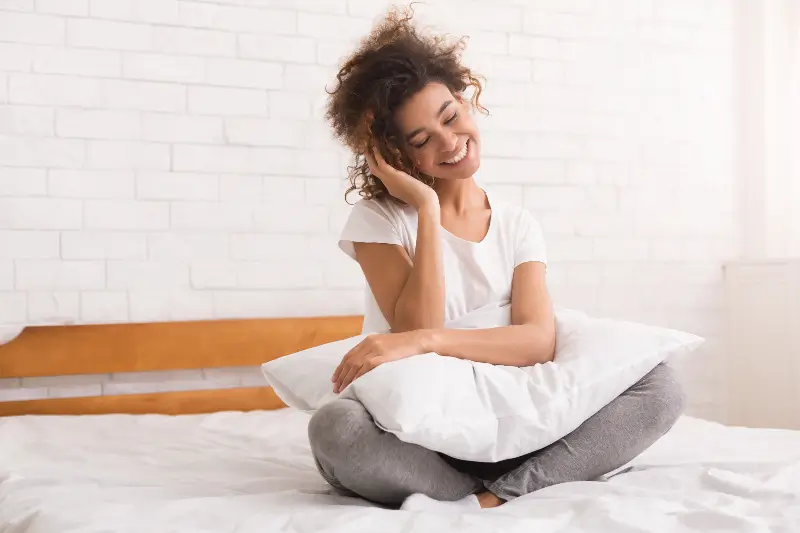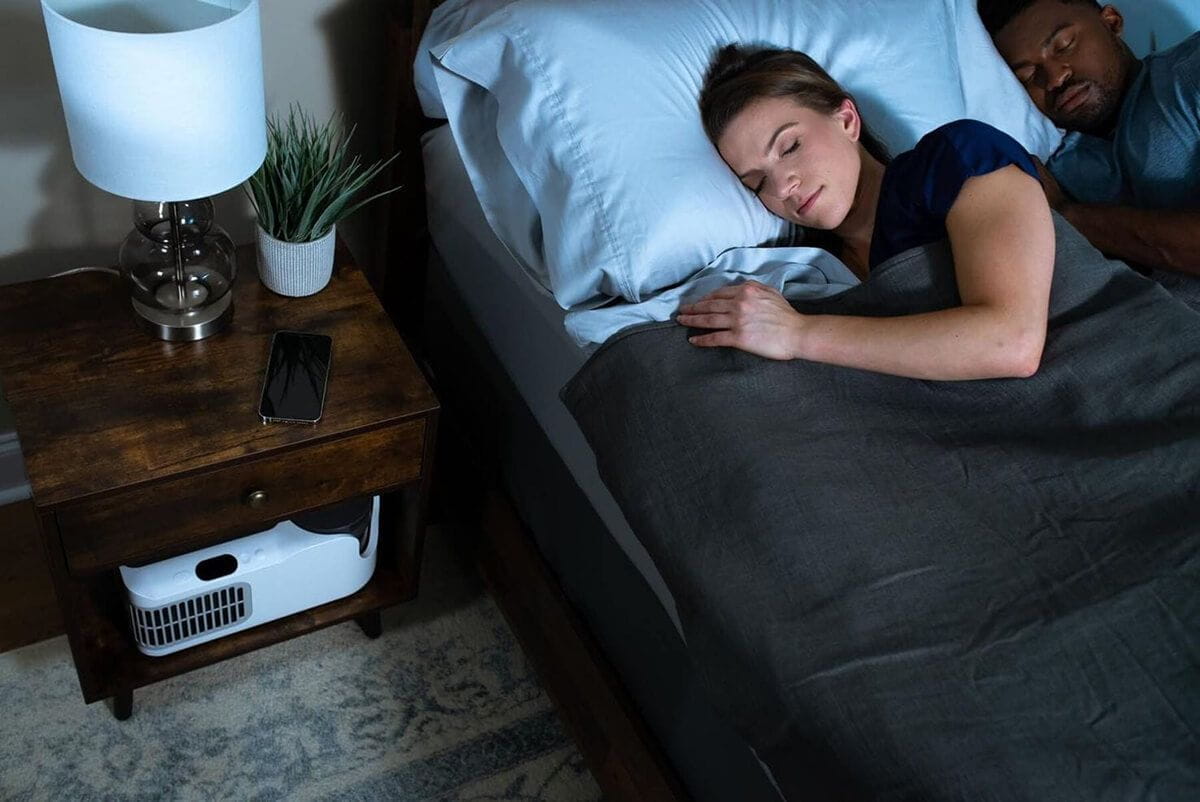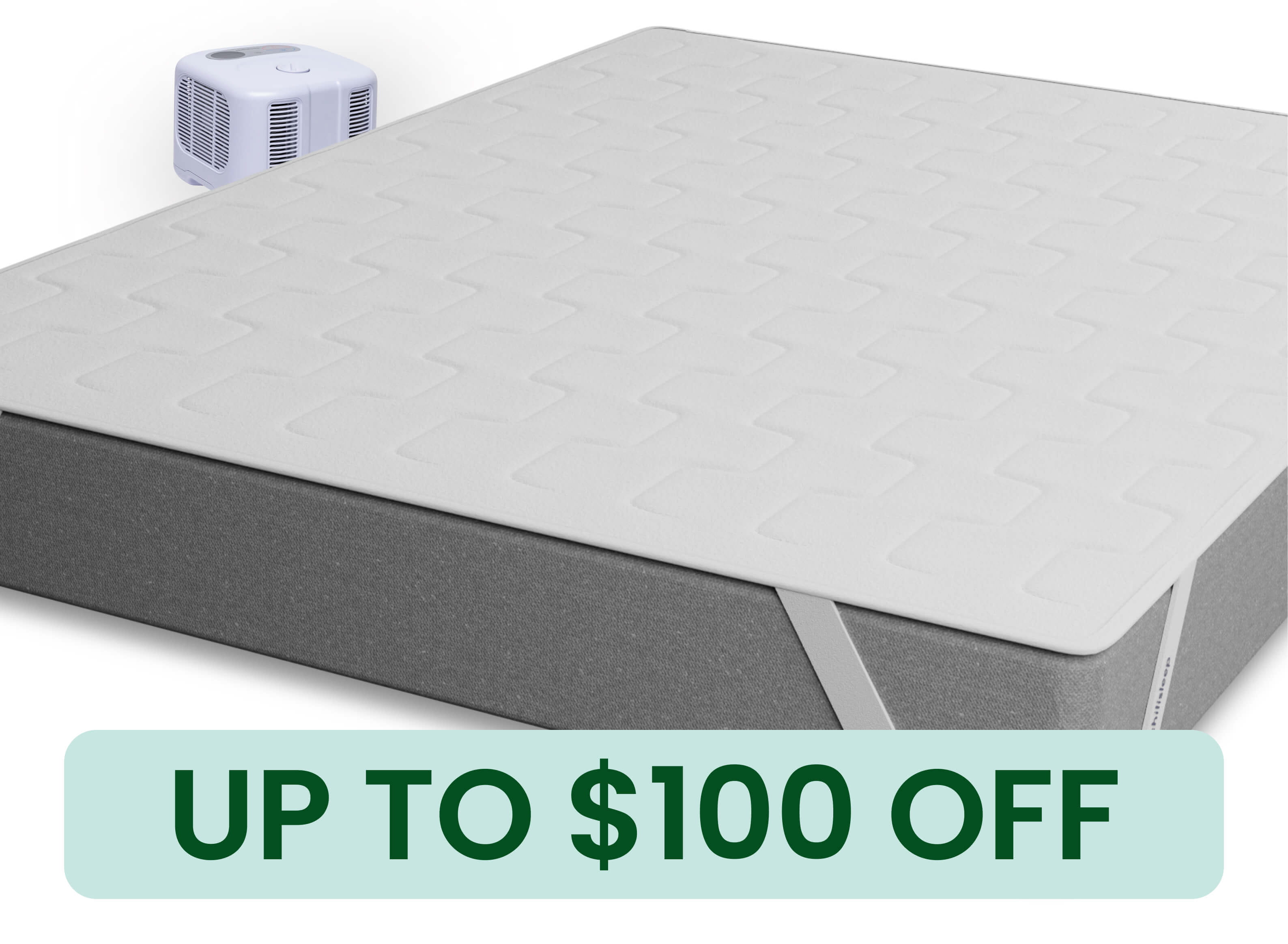
Key Takeaways
- When sleeping, our bodies release heat, making us feel hot at night.
- To combat overheating during sleep, consider using a cooling mattress topper to dissipate heat and promote a comfortable sleep environment. Additionally, cooling sheets, taking a cool bath before bed and avoiding strenuous exercise before bedtime.
- The body's temperature naturally drops at night, but some people may still experience hot flashes or night sweats.
- Menopause, hyperthyroidism, and sleep apnea are medical conditions that can cause people to experience hot flashes while sleeping.
- Talk to your doctor if you are concerned about getting hot when you sleep or waking up hot at night. They can help you rule out any underlying medical conditions and recommend treatment options.
You might wake up feeling too hot at night for several causes, such as wearing warm clothes or bedding, experiencing hot flashes, taking certain medications, or having an underlying medical condition.
During the day, the human body maintains a consistent temperature, which drops by approximately 1.8 degrees Fahrenheit at night. Nevertheless, some individuals still feel hot at night due to their sleep environment, something they ate or drank, unique body composition, or other medical reasons.
Let's look at some of the most common causes of why you're getting hot at night and potential causes of night sweats.
Experience the Chill: Discover Cool Comfort
Bid farewell to night sweats! Enhance your sleep quality with our Chilipad Dock Pro and Chilipad Cube sleep systems to avoid night sweats caused by overheating at night.
The Science: How Radiant Heat Affects Your Sleep Quality
There are reasons why you radiate heat during your sleep. The human body undergoes a natural cooling process that starts approximately two hours before sleep and lasts through the night until waking up. During this process, the core body temperature decreases while the skin temperature rises, which may cause some individuals to feel warm at night.
The body cools itself through a process known as vasodilation, wherein the blood vessels in the body dilate or widen, allowing for increased blood flow to the surface of the skin.
This increased blood flow helps to release heat from the body into the surrounding environment, thereby cooling the body down. This process is crucial for maintaining a stable body temperature and ensuring a good night's sleep.
Human Body Temperature: The average standard human temperature is 98.6ºF, and some studies consider the average temperature between 97ºF and 99ºF. In fact, one person can release up to 100 watts of excess heat.
Sleep Study: Research recently showed that “hot sleepers” can affect 10% to 41% of people. [1, 2]

Top Reasons You Get Hot at Night
Healthcare professionals generally refer to true night sweats as repeated episodes of severe hot flashes and heavy sweating during sleep that soak through your pajamas and sheets. Sweating is often caused by illness, acute stress, or underlying conditions.
Some possible conditions that would warrant a call to your doctor.
Even if your bedroom is set at the recommended temperature for sleep, usually between 66 to 70ºF, it can still feel too warm throughout the night. Several factors, including your pre-sleep routine, bedding and bed, certain medical conditions, and some medication, can cause this. [3] They can contribute to why you get so hot in bed at night.
Human Body Temperature: The average standard human body temperature is 98.6ºF, and some studies consider the average temperature between 97ºF - 99ºF.
1. Menopause
Women in perimenopause or menopause [4] often experience hormone-related hot flashes and night sweats.
We were recently involved in a Wake Forest menopause study, which studied the role of sleeping colder and symptoms, including hot flashes and sweating at night.
Menopause Statistics: Approximately 80% of women experience hormone-related sweats and hot flashes. [5]
Sleepme Menopause Study Result
Women in the menopause study said sleepme’s cooling products significantly changed their sleep patterns and sleep ability. [6] Below are the findings:
- 57% saw a decrease in the severity of hot flashes
- 60% saw a decline in the frequency of hot flashes
- 64% saw a decrease in the frequency of night sweats
2. Hormonal Changes
Hormonal changes cause another reason you may get so hot. These changes during pregnancy can cause increased blood flow and a rise in body temperature. Obstructive sleep apnea and hyperthyroidism are two distinct causes of why you might be hot at night.
Low testosterone levels in men have been identified as a probable cause of night sweats in men and sleeping hot. Temperature-controlled sleep is vital for repairing muscle after a hard day's work, improving cognitive function for starting the day feeling alert and restoring testosterone levels.
Did You Know: Men often have night sweats but experience fewer than women, possibly because menopause is a leading cause of sleeping hot and sweating at night.
Sleepme Newsletter
Stay up to date to receive exclusive discounts, sleep tips and the latest in sleepme news.
3. Medication Side Effects
Specific medications can also make people sleep hotter at night, potentially raising your body temperature and inducing excessive sweating:
- Migraine medications in the triptan family can cause excessive sweating as a side effect.
- Cortisone, prednisone, and prednisolone may be associated with flushing or night sweats. [7]
- Some antidepressants.
- Certain diabetes medications may increase sweating, primarily if used alongside alcohol which can be a reason why you get so hot.
- Over-the-counter medicines taken to lower fever (aspirin or acetaminophen) can sometimes lead to sweating and affect the body's ability to regulate temperature.
Contact your doctor and see if you can adjust certain medications.
4. Stress and Anxiety
Feeling hot and starting to sweat during anxious moments is quite natural, as it's part of the body's reaction to stress. When we're anxious, our heart rate and body temperature can change, triggering these responses. [8]
It's also common to physically react to frightening dreams or nightmares, experiencing a similar increase in body heat and sweating. This is just your body's way of responding to the stress or fear experienced in your dreams.
Did You Know: An overactive mind can accelerate your body, resulting in sweating and feeling hot in bed.
It's recommended to try deep breathing exercises, which can help you control anxiety and stress.
5. Nightime Fever
Another reason you may get so hot can be from a fever, a manifestation of the body's defense against infection, which can trigger a sensation of hotness due to the elevated body temperature. Upon the fever's resolution, skin temperature reveals the body begins cooling, expelling excess heat through sweating.
6. Pre-sleep Activities
Before bedtime, without knowing it, some activities you perform can potentially increase your body temperature and make it more difficult to fall asleep.
- Caffeine: Consuming close to bedtime can make it difficult for some, as it can increase our core body temperature.
- Exercise: Sleep may be impaired if an individual performs intense exercise leading up to bedtime.
- Sex: Like exercise, sex can increase your heart rate and body temperature.
- Stressful Activities: Your blood vessels constrict when feeling stressed, causing your skin temperature to drop and increase your core body temperature.
- Spicy Food: Consuming before bedtime can affect the severity of sweating.
7. Bedroom and Sleep Environment
Your sleeping environment tends to become warmer as you lie down. This can involve a rise in the room's temperature and moisture levels.
As mentioned above, our core body temperature plays a significant role. We need to drop our core temperature by about three degrees Fahrenheit to initiate sleep and then stay asleep. In scientific terms, your circadian rhythm is how your body understands when it's time to go to sleep.
The average adult generates 75 to 90 watts of heat during the night. Sharing a bed with a partner, child, or pet can contribute to an additional increase in the bed's temperature, potentially leading to discomfort.
Remember, sleeping at a cooler temperature is critical to improving deeper sleep!
Keep in mind another factor of why you sleep hot can include sunlight. During the day, the sunlight that your home is exposed to heats the floors, walls, and other spaces. The heat is absorbed and retained. The sun goes down, and there's no more heat to absorb. The walls and floors begin to release the heat from the day back into the room.
Are you and your significant other often at odds about the ideal sleep temperature? Discover practical solutions and insights by reading Help for Couples Who Argue About Sleep Temperature. Dive into the world of harmonious sleeping environments by visiting now and start your journey towards a peaceful, temperature-balanced night's sleep!
Hot Sleeper Fact: 4 out of 5 people report that cool temperature is one of the most important factors in getting a good night's sleep. [13]
8. Body Composition
Their body composition may influence the way people perceive temperature. Individuals with more lean muscle mass may generate more heat due to their higher metabolism. A higher rate of metabolism would result in an overall higher body temperature.
Furthermore, studies suggest that people who weigh more may be more susceptible to heat and may prefer lower temperatures.
How to Sleep Cooler at Night
Experiencing discomfort from excessive heat can make it difficult to fall asleep or stay asleep. If you're one of the 10% to 41% of people who sleep hot at night, you can take several steps to create an optimal sleeping environment and help regulate your core temperature.
Avoid Alcohol Before Bedtime
Alcohol tends to disrupt your sleeping patterns and ability to go to sleep, but it can also influence how much you sweat. Even if you're not prone to sleeping hot when drinking alcohol, your blood vessels dilate, and your heart rate increases, provoking perspiration while sleeping.
Stay Hydrated
Whether you know it or not, your body loses a lot of water, nutrients, and minerals when you sweat. Leading up to bedtime, place a glass of cold water by your bed at night. Take a few sips if you wake up in the middle of the night sweating, as it can help you cool down. If you feel yourself beginning to heat up, proactively sip on the cool beverage.
Keep in Mind: Drinking water at night has its benefits, but it can be disruptive to your sleep, potentially leading to frequent nighttime wakings to use the bathroom.

Sleepwear
If you suffer from your body overheating at night, you're probably no stranger to having to change your sheets, or even your pajamas, in the middle of the night. It would be best to try to wear loose-fitting and comfortable clothing, [8] paying close attention to the fabric.
Avoid flannels and polyesters as they tend to trap body heat and increase the chances of sweating. Instead, select more natural and softer fabrics such as cotton.
Pajamas and other sleepwear made from bamboo naturally cool the skin temperature and are 100% biodegradable. Or if natural is your thing, don't wear anything at all. We promise we won't judge. It would help if you also kept these fabric tips in mind when purchasing your bedding. Certain items can trap heat making you feel hot when you sleep.
Did You Know: Common Sleeping Preferences
- 52% sleep partially clothed
- 31% sleep fully clothed
- 17% sleep naked.
Adjust the Thermostat
Whether hot or cold, consider your room temperature for a quick and easy fix. You can easily adjust your thermostat to your preference, and the temperature change could quickly get expensive, mainly depending on the hot weather and the time of year.
Ceiling fans are also an easy fix, although depending on the strength and location, a fan might not be able to cool you down completely. Ceiling Fans are known to circulate air, not necessarily cool your core body temperature.
This is a huge upgrade from the previous version. It gets cool and stays cool all night. It is easy to control using the app on a phone. The cooling pad is more comfortable than the previous version, you do not even know it is there. It is a very good investment ent for the price. If you are a hot sleeper this is a great product to help you get the sleep you need.
Clyde H.
Sleepme Customer
Hot Bath Before Bedtime
Yes, you read that correctly. Take a hot bath an hour or so before bed. Sure, this will increase your body temperature initially. When your body cools down, it helps your body get ready for bed.
Sleeping Tip: Not only can it help you cool down, a warm shower or bath a few hours before bedtime can help you unwind and fall asleep faster. [10]
Avoid Strenuous Exercise Before Bedtime
Finding time to exercise with a busy schedule can be challenging, making the evening hours an option. If after work is the best time for your exercise routine, try not to do anything too vigorous before bedtime, as this can elevate your body temperature.
Recent studies have proven that an exercise regimen can help promote deeper sleep too. [11] However, an intense workout 60 minutes before bedtime can ultimately increase the time it takes you to fall into a deep sleep. It can reduce the total amount of sleep overall and make you more likely to wake up during the night.

Invest in a Cooling Mattress Toppers
At sleepme, we offer various bed cooling systems and cooling products that can help cool you down and allow you to fall asleep faster, stay asleep, and wake up rested.
When Should I Be Worried About Sleeping Hot?
You may not need to worry if you experience night sweats and periodically sleep hot. You can try adjusting your pre-bed habits, air conditioning, and bedroom temperature to alleviate the issue.
However, if the problem persists, scheduling an appointment with your primary doctor is best. They can help rule out underlying medical conditions that may be causing your symptoms, such as chills, fever, unexplained weight loss, or pain.
Additionally, if you frequently experience sleeping hot, it's a good idea to keep a journal. Record how often you get hot in bed and the symptoms you experience. This information can help your doctor identify the potential cause of your sweating and determine the best course of action.
Takeaway
As you can see, there are many factors why you sweat in your sleep at night. Some items include bedroom temperature, pajamas, illnesses, and certain medications that can all contribute to cause higher body core temperatures.
Given that we spend approximately one-third of our lives in bed, [12] finding a solution to eliminating sleeping hot and getting a good night's sleep is important. Whether it's a cooling mattress pad or merely adjusting your workout regimen, slowly make adjustments to see what can help improve sleep quality for you.
Remember, it might be best to set up an appointment with your doctor to rule out an underlying medical condition.
Citations / Resources
[1] James W. Mold, Barbara J. Holtzclaw, Laine McCarthy The Journal of the American Board of Family Medicine Nov 2012, 25 (6) 878893; DOI: 10.3122/jabfm.2012.06.120033
[2] Mold, J. W., Mathew, M. K., Belgore, S., & DeHaven, M. (2002). Prevalence of night sweats in primary care patients: an OKPRN and TAFP-Net collaborative study. The Journal of family practice, 51(5), 452–456.
[3] Mold, J. W., Mathew, M. K., Belgore, S., & DeHaven, M. (2002). Prevalence of night sweats in primary care patients: an OKPRN and TAFP-Net collaborative study. The Journal of family practice, 51(5), 452–456.
[4] Deecher, D. C., & Dorries, K. (2007). Understanding the pathophysiology of vasomotor symptoms (hot flushes and night sweats) that occur in perimenopause, menopause, and postmenopause life stages. Archives of women's mental health, 10(6), 247–257. View Study
[5] Bansal, R., & Aggarwal, N. (2019). Menopausal Hot Flashes: A Concise Review. Journal of mid-life health, 10(1), 6–13. View Study
[6] Avis, N. E., Levine, B. J., & Coeytaux, R. (2022). Results of a pilot study of a cooling mattress pad to reduce vasomotor symptoms and improve sleep. Menopause, 29(8), 973–978. View Study
[7] Roberts, L. N., Bagot, C. N., Patel, R. K., Whitehead, M., & Arya, R. (2009). Late onset hypogonadism: an alternate cause for night sweats in the haematology clinic. British journal of haematology, 145(3), 435–437. View Study
[8] (2020). Stress in America, A National Health Crisis [Blog post]. View Resource
[9] Kingma, B., Frijns, A., & van Marken Lichtenbelt, W. (2012). The thermoneutral zone: implications for metabolic studies. Frontiers in bioscience (Elite edition), 4(5), 1975–1985. View Study
[10] Herborn, K. A., Graves, J. L., Jerem, P., Evans, N. P., Nager, R., McCafferty, D. J., & McKeegan, D. E. (2015). Skin temperature reveals the intensity of acute stress. Physiology & behavior, 152(Pt A), 225–230. View Study
[11] Haghayegh, Shahab, et al. “Before-Bedtime Passive Body Heating by Warm Shower or Bath to Improve Sleep: A Systematic Review and Meta-Analysis.” Sleep Medicine Reviews, vol. 46, Aug. 2019, pp. 124–135, 10.1016/j.smrv.2019.04.008.
[12] Kline C. E. (2014). The bidirectional relationship between exercise and sleep: Implications for exercise adherence and sleep improvement. American journal of lifestyle medicine, 8(6), 375–379. View Study
[13] Aminoff, M. J., Boller, F., & Swaab, D. F. (2011). We spend about one-third of our life either sleeping or attempting to do so. Handbook of clinical neurology, 98, vii. View Study
[14] Pacheco, D. (2020, October 29). The Best Temperature For Sleep: Advice & Tips. View Resource






